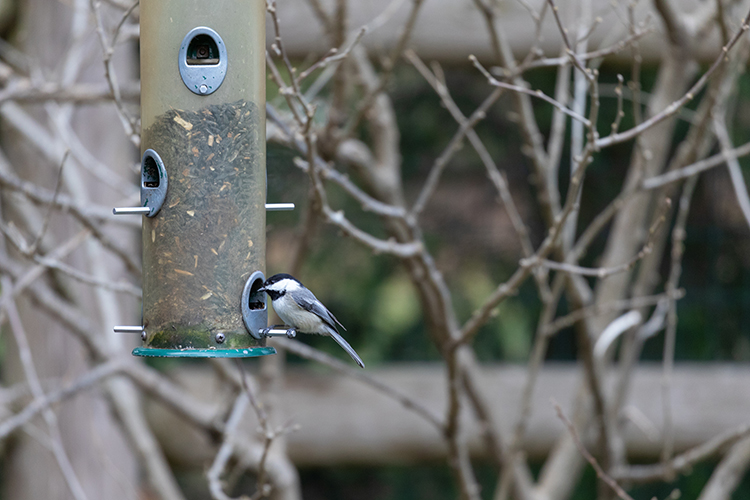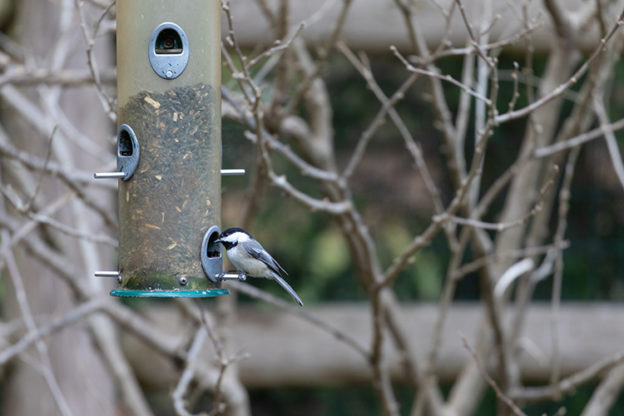Enjoying watching birds visit your feeder? Great! Make sure the birds that visit stay healthy by keeping your feeder clean.

Why a Clean Feeder is a Happy Feeder
High concentrations of birds in close proximity to one another can contribute to the spread of disease at bird feeders. The four diseases that most frequently affect birds that use feeders are: salmonella, trichomoniasis, aspergillosis, and avian pox.
All of these diseases are transmitted from one bird to another at feeding stations, especially when overcrowding occurs. Birds are also susceptible to mites and lice. There are many steps you can take to help keep feeder birds and people safe and healthy.
How to Keep Birds Healthy
- Clean feeders every 2 weeks using one part bleach to nine parts warm water. Soak the feeder in the solution for a few minutes, rinse, and air dry.
- If uneaten food is accumulating in or under feeders, consider using less food or switch to a seed more to the birds’ liking.
- If birds are fighting over space at a feeder, consider adding more feeders to alleviate the congestion that can potentially be responsible for the rapid spread of disease.
- Store seed in airtight containers to prevent spoilage.
- Avoid throwing large amounts of food on the ground or alternate ground feeding areas so that uneaten food does not accumulate and develop bacteria or mold.
- If dead birds are found, stop feeding for a few weeks and thoroughly clean feeders and areas under feeders. Use disposable gloves when handling dead birds.
Learn More
Get answers to bird feeding frequently asked questions. Still have questions? Ask our wildlife experts.



cause of current bird epidemic
Beginning in early spring I noticed the water in my cement birdbath (that stays out all winter) turn to a red/ rust color. I am in the habit of scrubbing and rinsing it approx. every 2-3 days before I put fresh water in. I’ve never used bleach but I will going forward.( I didn’t know it was safe for the birds.) I mentioned this to a friend today and he said the same thing happened to him this year. His birdbath is plastic and heated. This was a first for him also. Did anyone else notice this?
My friend who is also a scientist indicated that if the cause of the disease is bacterial it would probably thrive or exist in a wet environment more easily than a dry environment. we paused using the birdfeeders today but are doubtful that could be the source if it is indeed bacterial?
With the caveat that there is really very little indication so far of what is causing the disease, there are definitely some bacteria that do better in moist environments as well as plenty that can be transmitted via dry surfaces in ambient humidity. Feeders have been documented as the transmission point for some bacterial avian diseases, like salmonella and finch conjunctivitis, both of which have affected other regions of the country in the past couple of years. In the case of salmonella outbreaks, the issue seems to mostly be fecal contamination of perches or platform feeders (birds aren’t picky about where they poop– especially ones with a salmonella infection)! The fact that feeders have been implicated in the spread of other avian epidemics is one reason we think it’s safest to keep feeders in for the time being.
Much prefer a 1:3 cider vinegar/water mix to bleach. Scrub, dry, repeat every 2 weeks.
We strongly recommend bleach over cider vinegar, although straight vinegar might partially disinfect the feeder. Bleach solutions leave less residue than cider vinegar, which contains sugars that bacteria can grow on, and bleach solutions are also harmless to birds– bleach breaks down into salt and water!
Thanks for posting this! There are some reports of sick Pine Siskins on the MassBird list — so this is very timely.